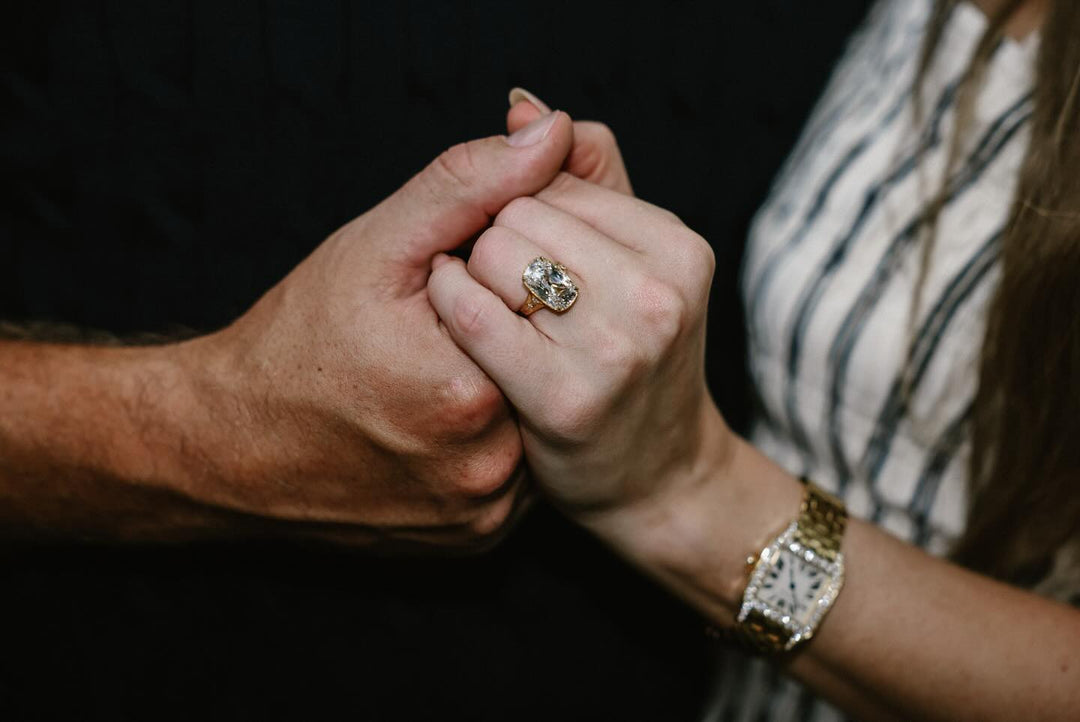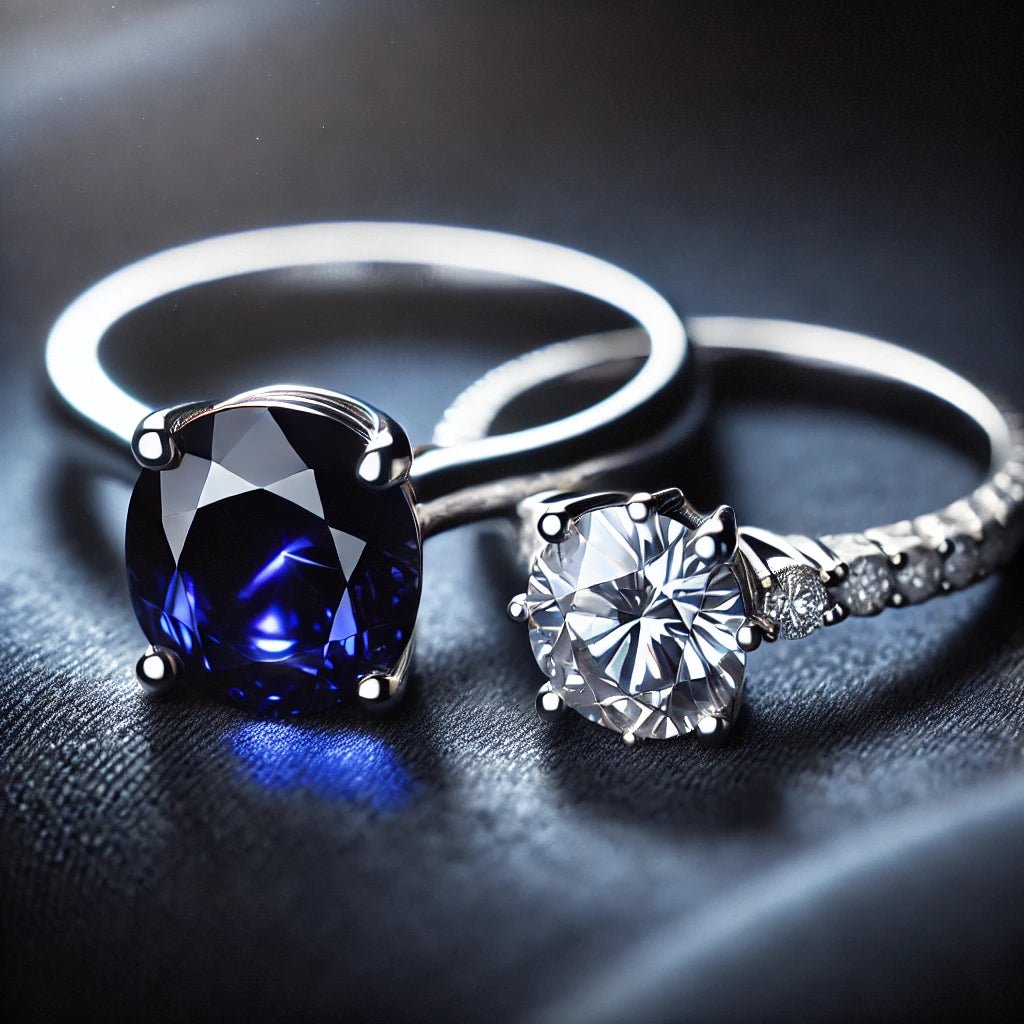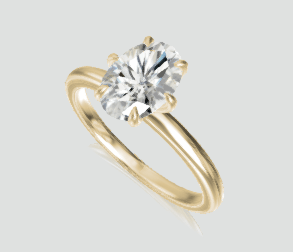How To Find MM To Carat Weight Conversions For Diamonds And Gemstones
Understanding Gemstone Sizes Compared to Diamonds
As moissanite and other gemstone rings become increasingly popular alternatives to classic diamond engagement rings, many customers often inquire about how to measure a gemstone’s size in comparison to a diamond’s. To address some of the most frequently asked questions about converting gemstone millimeter dimensions to carats, we've put together some helpful tips!
How Do You Measure the Size of a Diamond?
Most people know that diamonds are measured in carats, but what many may not realize is that carats measure weight, not dimensions. While carat weight influences the overall look and size of a diamond, carats do not directly equate to size. Two diamonds with the same carat weight can appear different based on how they carry their weight. For example, elongated fancy-shaped diamonds with shallower depths and longer dimensions can appear larger in a ring or on a finger than classic round diamonds of the same carat weight. Additionally, poor diamond cutting can affect a diamond's appearance, hiding extra weight below the diamond’s girdle—the base typically covered by the ring. Thus, a poorly cut 1.25 ct. round diamond might look the same size as a well-cut 1 ct. round diamond to the naked eye.
That said, carat weight still provides a good indication of a diamond's size. One carat equals 200 milligrams, or 0.2 grams, and is divided into 100 “points.” This allows gemologists to provide extremely precise measurements to the hundredth decimal place. An easy way to think about carat weight is to compare it to dollars and cents—they're even written the same way! For instance, $2.25 means two dollars and twenty-five cents, and 2.25 ct. means two carats and 25 points. Carat is one of the classic “4 C’s” of diamond grading established by the GIA to standardize diamond quality assessment, along with cut, color, and clarity.
Gemstone Weight vs. Gemstone Size
While some jewelers measure gems other than diamonds in carats, at Brilliant Earth, we categorize gemstones by their millimeter dimensions instead. This is because different gemstones have different densities, meaning that certain gems will look different from diamonds of the same carat weight. As mentioned earlier, carats measure weight, not size, and were invented specifically for diamonds. Therefore, it makes sense to use a different measurement approach for other gemstones.
Gemstones like rubies, sapphires, zircon, and garnet are all denser than diamonds. Other popular gems such as moissanite, topaz, jade, peridot, emerald, tourmaline, morganite, amethyst, citrine, opal, and aquamarine are significantly less dense than diamonds. Consequently, a 1.5 ct. round ruby will appear smaller than a 1.5 ct. round diamond because rubies are naturally denser and heavier.
Due to their different densities, comparing gemstone millimeter dimensions to diamond carat weights is more of an approximation than an exact science. The charts below show the approximate diamond carat weight comparisons for the most popular gemstone sizes we offer.
Round and perfectly square gems have the same diameter from all angles and, therefore, one measurement listed, for example, “8mm.” Gemstones in other shapes will have both their length and width listed in millimeters. Considering the length-to-width ratio is helpful for those trying to achieve a specific look. For instance, radiant cut gems can look more square or more rectangular based on their length-to-width ratios. A radiant cut gem with a 1:1 ratio will appear square, while one with a 2:1 ratio will look much more elongated. Other fancy shapes like ovals and pears can look more rounded or slender based on their ratios.
By understanding these differences, you can make more informed decisions when choosing between diamonds and other gemstones for your jewelry.
Round

| Round MM Size | Round Carat Weight |
| 4mm | 0.25 ct. |
| 4.5mm | 0.36 ct. |
| 5mm | 0.5 ct. |
| 5.5mm | 0.66 ct. |
| 5.75mm | 0.75 ct. |
| 6mm | 0.84 ct. |
| 6.5mm | 1 ct. |
| 7mm | 1.3 ct. |
| 7.5mm | 1.67 ct. |
| 8mm | 2 ct. |
| 8.5mm | 2.11 ct. |
| 9mm | 2.75 ct. |
| 9.5mm | 3.35 ct. |
| 10mm | 3.87 ct. |
| 10.5mm | 4.41 ct. |
| 11mm | 4.91 ct. |
Oval

| Oval MM Size | Oval Carat Weight |
| 6x5mm | 0.61 ct. |
| 7.7×5.7mm | 1 ct. |
| 8x6mm | 1.25 ct. |
| 9x6mm | 1.41 ct. |
| 9x7mm | 2 ct. |
| 10x7mm | 2.18 ct. |
| 10x8mm | 2.5 ct. |
| 12x8mm | 3 ct. |
| 11x9mm | 3.85 ct. |
| 12x10mm | 5.05 ct. |
Emerald

| Emerald MM Size | Emerald Carat Weight |
| 7x5mm | 1 ct. |
| 7.5×5.5mm | 1.5 ct. |
| 8x6mm | 1.75 ct. |
| 9x7mm | 2.5 ct. |
| 10×7.5mm | 3 ct. |
| 10x8mm | 3.79 |
| 11x9mm | 5.21 ct. |
| 12x10mm | 6 ct. |
Princess

| Princess MM Size | Princess Carat Weight |
| 5.5mm | 1 ct. |
| 6mm | 1.25 ct. |
| 6.5mm | 1.5 ct. |
| 7mm | 2 ct. |
| 7.5mm | 2.5 ct. |
| 8mm | 3 ct. |
| 9mm | 4.12 ct. |
Pear

| Pear MM Size | Pear Carat Weight |
| 7x5mm | 0.75 ct. |
| 7.5×5.5mm | 0.85 ct. |
| 7.7×5.7mm | 1 ct. |
| 8x6mm | 1.25 ct. |
| 8.5×6.6mm | 1.5 ct. |
| 10x6mm | 1.71 ct. |
| 9x7mm | 2 ct. |
| 10x8mm | 2.5 ct. |
| 11x8mm | 2.7 ct. |
| 12x8mm | 3 ct. |
| 13x8mm | 3.4 ct. |
Cushion

| Cushion MM Size | Cushion Carat Weight |
| 5.5mm | 1 ct. |
| 6mm | 1.25 ct. |
| 6.5mm | 1.5 ct. |
| 7mm | 2 ct. |
| 7.5mm | 2.5 ct. |
| 8mm | 3 ct. |
| 9mm | 4.12 ct. |
| 10mm | 5.62 ct. |
| 11mm | 7.44 ct. |
| 12mm | 9.52 ct. |
Marquise

| Marquise MM Size | Marquise Carat Weight |
| 7x3mm | 0.3 ct. |
| 8x4mm | 0.5 ct. |
| 9×4.5mm | 0.75 ct. |
| 10x5mm | 1 ct. |
| 11x6mm | 1.33 ct. |
| 12x6mm | 1.5 ct. |
| 13×6.5mm | 2 ct. |
| 14x7mm | 2.5 ct. |
| 15x7mm | 3 ct. |
Asscher
| Asscher MM Size | Asscher Carat Weight |
| 5.5mm | 1 ct. |
| 6mm | 1.25 ct. |
| 6.5mm | 1.5 ct. |
| 7mm | 2 ct. |
| 7.5mm | 2.5 ct. |
| 8mm | 3 ct. |
| 8.5mm | 3.5 ct. |
| 9mm | 4.12 ct. |
| 10mm | 5.62 ct. |
Radiant

| Radiant MM Size | Radiant Carat Weight |
| 6x4mm | 0.5 ct. |
| 7x5mm | 1 ct. |
| 7.3×5.5mm | 1.25 ct. |
| 7.5×5.8mm | 1.5 ct. |
| 8x6mm | 2 ct. |
| 9x7mm | 2.5 ct. |
| 10x7mm | 3.31 ct. |
| 10x8mm | 3.5 ct. |
| 11x9mm | 5.05 ct. |
Heart

| Heart MM Size | Heart Carat Weight |
| 5mm | 0.5 ct. |
| 5.5mm | 0.61 ct. |
| 6mm | 0.75 ct. |
| 6.5mm | 1 ct. |
| 7mm | 1.25 ct. |
| 7.5mm | 1.5 ct. |
| 8mm | 2 ct. |
| 8.5mm | 2.5 ct. |
Final Thoughts
For additional assistance in visualizing the sizes of diamonds or gemstones, our expert jewelry specialists are always available to answer your questions and provide images. You can meet with one of our specialists in person at one of our showrooms, book a virtual appointment, or chat with them live on our website. Have more questions about diamond and gemstone sizing?




